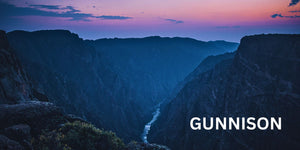Gunnison Altitude: Complete Guide & 5 Tips

Gunnison, Colorado sits at an altitude that can cause visitors a problem. As a local company in Colorado, we’ll review everything you need to know about Gunnison altitude and the best tips to avoid altitude sickness.
Gunnison Altitude
The elevation of Gunnison CO is 7,703 feet above sea level. For perspective, Denver, known as the "Mile-High City," is at 5,280 feet, making Gunnison’s altitude significantly higher.
Gunnison CO Altitude:
- Gunnison Altitude - 7,703 ft (2,348 m)
Gunnison is surrounded by a national park and ski resorts that climb even higher in altitude.
High-altitude destinations near Gunnison:
Black Canyon altitude - 8,775 ft (2675 m)
Gunnison National Park average altitude - 8,000 ft (2438 m)
Crested Butte altitude - 8,909 ft (2,715 m)
Even for the mountains, these are high elevations in and around Gunnison Co.
What Is The Highest Point In Gunnison National Forest?
The highest point in Gunnison National Forest is Poison Spring Hill, which sits at 9,040 feet high.
- Poison Spring Hill altitude - 9,040 ft (2755 m)
Black Canyon also is another high point in Gunnison National Forest, reaching 8,775 feet.
How Far Is Gunnison From Denver?
Gunnison is approximately 200 miles from Denver, taking about three and a half hours to drive.
Is Gunnison Considered High Altitude?
Yes, Gunnison is considered high altitude.
At 7,703 feet, Mountain Medicine would classify Gunnison as high altitude.⁵
Is Altitude Sickness Common In Gunnison Colorado?
Yes, altitude sickness can be a common risk in Gunnison Colorado.
On average there’s 23% less oxygen than sea level at the elevation of Gunnison.
Even Denver commonly causes visitors to struggle with altitude sickness which is over 2,000 feet lower than Gunnison. At much higher altitudes, you’ll want to be well prepared for Gunnison altitude sickness.
Gunnison Altitude Sickness
Altitude sickness in Gunnison can be a real struggle due to the lower oxygen levels.
These reduced oxygen levels can be stressful on the body including oxidative stress and dehydration, furthering the risk of altitude sickness.
Symptoms of Gunnison altitude sickness may include:
- Headaches
- Nausea
- Vomiting
- Extreme fatigue
- Dizziness or feeling lightheaded
- Trouble sleeping or insomnia
- Shortness of breath
- Loss of appetite
- Overall feeling ill
Be on the lookout for these types of symptoms, which usually develop upon arrival within 6-24 hours. Follow our best tips below to help beat the elevation.
5 Tips To Beat Gunnison Altitude Sickness
Visiting Gunnison and its surrounding mountains with its impressive altitude over 7,000 feet is an adventure in itself.
To beat the challenges of high altitude, we share our best tips below from our local experience in Colorado.
Here’s 5 Tips To Beat Gunnison Altitude Sickness:
1. Maintain Your Hydration
The air at high altitudes like Gunnison is drier, and you lose more moisture through increased respiration. In fact, fluid loss can be twice as fast than sea level, making dehydration a problem.⁶
Drink plenty of water throughout the day to keep your body well-hydrated, aim for at least a half a gallon minimum a day.
2. Ascend Gradually
Gradual acclimatization can help your body adjust to the lower oxygen levels by avoiding drastic changes. When possible, ascend gradually on your trip to Gunnison.
For example, if you’re flying into DIA, you can stay a night or two in Denver at 5,280 feet before going up to 7,703 feet.
3. Limit Alcohol
Limit your alcohol intake, especially during the first few days at Gunnison until you feel acclimated.
4. Take Antioxidants
Antioxidants can play a supportive role in combating the oxidative stress that comes in high altitudes.[⁸][¹⁰] Glutathione alone was shown to decline by 45% in high elevation conditions.⁹
Consider taking supplements like Glutathione, which can support the body's antioxidant defenses and even help recycle nutrients such as vitamins C and E.¹⁰
5. Sleep & Rest Well
Sleep and adequate rest can be vital for the body to adjust and recover.⁷ Sleep has be shown to even help blood flow and oxygen.⁷
Shoot for a good night’s sleep, ideally 7-9 hours, and avoid overexertion during the day. To help enhance your sleep quality, get plenty of natural sunlight during the day which supports melatonin production at night.
By following these tips, you can make the most of your time in the stunning high-altitude environment of Gunnison.
Colorado-Based Mountain Supplement
Based out of Colorado, Zaca’s chewables are designed for outdoor enthusiasts, travelers, skiers and mountain adventurers.These powerful chewables fuel your body with premium ingredients to replenish, revive, and recover faster. Packed with essential antioxidants and vitamins, Zaca enhances your performance and hydration. Made with purity and potency in a delicious berry flavor, eat 2-4 chewables each day or when you need it most. Try Zaca’s chewable supplement today and bounce back faster on your mountain adventure.
SOURCES:
1. How high up is Gunnison Colorado?
https://www.gunnisoncounty.org/624/Gunnison
2. Gunnison Colorado Elevation
https://en.wikipedia.org/wiki/Gunnison,_Colorado
3. Black Canyon of the Gunnison National Park Elevations
https://peakvisor.com/park/black-canyon-of-the-gunnison-national-park.html
4. Altitude To Oxygen Chart
https://hypoxico.com/pages/altitude-to-oxygen-chart
5. Effects of high altitude on humans
https://en.wikipedia.org/wiki/Effects_of_high_altitude_on_humans
6. The Importance Of Drinking Water At High Altitude
https://summitoxygen.net/drinking-at-high-altitude/
7. Sleep: The Secret Ingredient of Injury Recover
https://www.orthocarolina.com/media/sleep-the-secret-ingredient-of-injury-recovery
8. High altitude and oxidative stress
https://pubmed.ncbi.nlm.nih.gov/17482529/
9. Effect of high altitude (7,620 m) exposure on glutathione
https://pubmed.ncbi.nlm.nih.gov/11320641/
10. Oxidative Stress and Diseases Associated with High-Altitude Exposure
https://www.ncbi.nlm.nih.gov/pmc/articles/PMC8868315/

